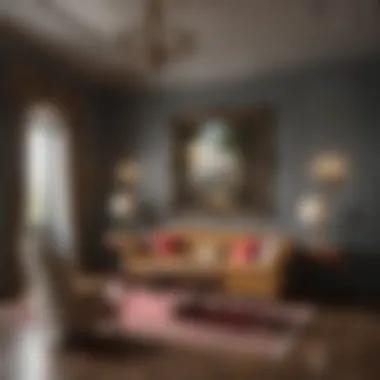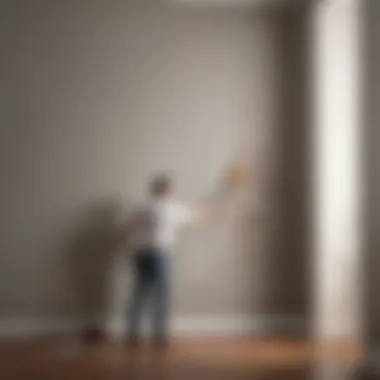Mastering the Art of House Painting: Transform Your Room into a Work of Art


Outdoor Decor Ideas
When embarking on the journey of house painting, the exterior of your abode sets the tone for what lies within. Ponder over seasonal inspirations to harmonize your dwelling with nature's ever-changing canvas. Delve into the nuances of furniture selection, ensuring each piece complements the overall aesthetic seamlessly. Explore the enchanting realm of decorative lighting, where luminosity intertwines with creativity. Strategically plan plant arrangements to infuse life and vibrancy into your exterior space. Consider hardscaping solutions for a cohesive and visually captivating outdoor layout. Embrace sustainable practices, intertwining harmony with the environment to create a sustainable and aesthetically pleasing outdoor oasis.
Outdoor Entertaining
Transitioning from the exterior to the outdoor entertaining spaces, envision hosting luxurious gatherings under the open sky. Refine your party planning skills with tips that elevate gatherings from mundane to memorable experiences. Stay abreast of al fresco dining trends, blending gourmet cuisine with the serenity of nature.
Exclusive Destinations
Journey to exclusive destinations that inspire and rejuvenate the soul. Seek out hidden gems off the beaten path, each possessing its own unique charm and allure. Indulge in the opulence of luxury resorts, where lavish amenities and impeccable service cater to your every whim. Retreat to private villas for a bespoke and secluded escape, embracing tranquility in luxurious seclusion.
Travel Guides
Immerse yourself in diverse cultural experiences, each offering a tapestry of traditions and values waiting to be discovered. Embark on culinary adventures, savoring exotic flavors and culinary masterpieces from around the globe. Navigate through shopping escapades in bazaars and boutiques, uncovering treasures that narrate stories of craftsmanship and heritage.
Home and Interiors
Delve into the realm of interior design trends, where innovation meets elegance to create spaces that captivate the soul. Embrace the art of home organization, cultivating harmony and functionality within your living environment. Explore smart home innovations that merge technology seamlessly with everyday living, enhancing convenience and comfort at every turn.
Introduction to House Painting
House painting is an art form that goes beyond mere aesthetics; it has the power to transform living spaces into captivating works of art. In this comprehensive guide, we navigate through the intricacies of house painting, from color selection to painting techniques, providing insightful tips to create visually appealing rooms that resonate with individual style and personality.
Understanding the Impact of Paint
Psychological Effects of Colors
The psychological effects of colors play a pivotal role in setting the ambiance and mood of a room. Certain hues evoke specific emotions and energies, influencing the overall feel of the space. Understanding these psychological nuances allows homeowners to craft atmospheres that align with their intentions, whether it be creating a serene sanctuary or a vibrant social hub.
Creating Visual Illusions with Paint
Paint is a versatile tool that extends beyond color; it can be utilized to create visual illusions within a space. From accentuating architectural features to altering perceptions of size and shape, strategic paint application can enhance the aesthetic appeal and functionality of a room, offering endless opportunities for creative expression.
Importance of Choosing the Right Paint
Quality vs. Cost Considerations


When it comes to selecting paint, striking a balance between quality and cost is paramount. High-quality paints not only ensure a smooth and durable finish but also contribute to the overall longevity of the paint job. Considering factors such as coverage, sheen, and durability against cost implications helps in making informed decisions that result in superior aesthetic outcomes.
Environmental Impact of Different Paint Types
In the age of sustainability, understanding the environmental impact of different paint types is essential. Opting for eco-friendly and low-VOC (Volatile Organic Compounds) paints contributes to healthier indoor air quality and reduces the ecological footprint of a painting project. Balancing environmental consciousness with performance aspects can lead to a more sustainable and responsible approach to house painting.
Essential Tools and Supplies
Brushes, Rollers, and Other Equipment
The right tools are fundamental to achieving professional painting results. Brushes, rollers, and other equipment vary in design and functionality, catering to different surfaces and painting techniques. Investing in high-quality tools not only enhances the painting process's efficiency but also ensures a flawless finish that elevates the room's overall aesthetic.
Protective Gear for a Safe Painting Experience
Prioritizing safety during painting projects is non-negotiable. Protective gear such as respirators, goggles, gloves, and coveralls shield painters from harmful fumes, accidental splatters, and skin irritants. Incorporating safety measures not only safeguards one's health but also fosters a conducive and secure painting environment for a seamless and worry-free experience.
Planning Your Room Transformation
To master the art of house painting and transform a room into a captivating masterpiece, meticulous planning is imperative. The section 'Planning Your Room Transformation' plays a pivotal role in ensuring a successful outcome. By carefully deliberating on factors such as color schemes, layout modifications, and ambiance goals, one sets the stage for a visually stunning transformation. This article delves into the nuances of preparing a room for painting, emphasizing the significance of meticulous planning in achieving desired results.
Selecting the Perfect Color Palette
In the quest to revamp a living space, choosing the ideal color palette is a critical step. 'Harmonizing with existing decor' involves aligning new colors with the room’s furnishings and aesthetics to create a coherent ambiance. This selection process requires a keen eye for detail, as integrating colors seamlessly can elevate the room's visual appeal. On the other hand, 'Utilizing color psychology for desired ambiance' delves into the emotional impact of colors on individuals and how specific shades can influence mood and atmosphere. Understanding these principles empowers homeowners to craft spaces aligned with their desired emotional resonances.
Harmonizing with existing decor
Harmonizing with existing decor is essential as it ensures a cohesive look and feel within the room. By complementing the furniture, fixtures, and accessories with the chosen color palette, a sense of balance and unity is achieved. This approach streamlines the visual flow of the room, creating a harmonious environment for occupants. While harmonizing with existing decor requires attention to detail and a nuanced understanding of design principles, the end result is a space that exudes sophistication and style.
Utilizing color psychology for desired ambiance
Utilizing color psychology facilitates the creation of specific moods and atmospheres within a room. By harnessing the psychological effects of colors, individuals can evoke feelings of serenity, energy, or creativity based on their preferences. Whether aiming for a calming retreat or a vibrant social setting, understanding color psychology empowers individuals to design spaces that resonate with their emotional needs. Despite its subjective nature, color psychology offers valuable insights into cultivating tailored atmospheres within living spaces.
Creating a Painting Timeline
Efficient scheduling plays a crucial role in minimizing disruptions during the painting process. By carefully outlining a timeline that accounts for prep work, painting, and drying periods, homeowners can streamline the transformation process. Factors influencing the duration of the painting process, such as room size, drying times, and the complexity of decorative techniques, must be considered when crafting a realistic timeline. Balancing efficiency with attention to detail ensures a smooth painting experience with minimal disruptions to daily routines.
Efficient scheduling for minimal disruption


Efficient scheduling involves coordinating tasks to optimize time and resources effectively. By breaking down the painting timeline into manageable segments and allocating sufficient time for each step, individuals can maintain productivity and organization throughout the project. From surface preparation to final touch-ups, a well-structured schedule enhances efficiency and prevents unnecessary delays. While adhering to a strict timeline may pose challenges, the benefits of a smoothly executed painting process far outweigh the initial planning efforts.
Factors influencing the duration of the painting process
Several factors can impact the duration of a painting project, ranging from room size and wall condition to the complexity of the desired paint finish. Understanding these variables allows homeowners to anticipate potential delays and allocate resources accordingly. Factors such as multiple coats of paint, intricate designs, and drying times necessitate careful consideration when estimating the project's timeline. By proactively addressing these influences, individuals can set realistic expectations and facilitate a seamless painting experience.
Preparation and Priming
Before embarking on the painting journey, thorough preparation and priming are essential steps for achieving professional results. ‘Surface cleaning and repair’ involves inspecting the walls, addressing any imperfections, and ensuring a smooth canvas for the paint application. This meticulous process lays the foundation for a flawless finish and enhances the longevity of the paint job. Simultaneously, ‘Understanding the significance of priming’ underscores the importance of using primer to enhance paint adhesion, promote uniform color coverage, and mitigate potential issues such as paint peeling or discoloration. While the preparation phase may seem time-consuming, its impact on the final outcome is invaluable, ensuring a durable and pristine finish that withstands the test of time.
Executing the Painting Process
House painting is not merely applying layers of color on walls; it is a meticulous process that requires precision and expertise. Executing the Painting Process holds paramount importance in the realm of house painting. It encompasses a myriad of specific elements that contribute to the overall success of the project. From choosing the right tools and techniques to understanding the dynamics of different paint mediums, executing this process seamlessly is essential for achieving professional results.
Painting Techniques and Tips
Brushing vs. Rolling vs. Spraying
When embarking on a house painting venture, determining whether to employ brushing, rolling, or spraying techniques is a critical decision. Each method possesses distinct characteristics that impact the final outcome. Brushing offers precision and control, ideal for intricate details and corners. Rolling, on the other hand, ensures a quick and uniform application, suitable for larger surfaces. Spraying provides a smooth, even finish, perfect for achieving a professional look.
Achieving Smooth Finishes and Clean Edges
One of the hallmarks of a well-executed paint job is the smoothness of the finish and the cleanliness of the edges. Achieving seamless surfaces and sharp lines requires attention to detail and technique. Employing quality brushes and rollers, maintaining consistent pressure, and implementing proper cutting-in methods all contribute to attaining impeccable results. Smooth finishes create a polished look, while clean edges enhance the overall aesthetic appeal.
Dealing with Common Painting Challenges
Preventing Drips and Runs
An inherent challenge in painting is avoiding drips and runs that can compromise the visual appeal of a finished wall. Preventive measures such as correct paint consistency, avoiding overloading brushes or rollers, and proper technique application play a pivotal role in mitigating these issues. By maintaining a steady hand and practicing controlled movements, drips and runs can be minimized, ensuring a flawless outcome.
Resolving Paint Adhesion Issues
Ensuring proper adhesion of paint to surfaces is paramount for long-lasting results. Paint adhesion issues, such as peeling or flaking, can occur due to inadequate surface preparation or unsuitable paint products. Resolving these issues involves identifying the root cause, which could range from moisture problems to incompatible primers. By addressing adhesion concerns promptly and effectively, the longevity and quality of the paint job can be preserved.
Incorporating Creative Elements
Accent Walls and Decorative Techniques


Incorporating creative elements like accent walls and decorative techniques can elevate the visual appeal of a room. Accent walls, painted in a striking color or texture, serve as focal points that add depth and character to a space. Integrating decorative techniques such as faux finishes or textured paints can lend a unique and personalized touch to the walls, transforming them into artistic features.
Utilizing Stencils and Patterns Effectively
Stencils and patterns offer a versatile means of embellishing painted surfaces with intricate designs and motifs. Utilizing stencils allows for the creation of geometric shapes, florals, or intricate patterns, enhancing the artistic merit of the walls. While offering a cost-effective way to achieve decorative flourishes, stencils also enable customization and creativity in interior design, providing a bespoke aesthetic to the space.
Finishing Touches and Post-Painting Care
Finishing touches and post-painting care play a pivotal role in the overall house painting process. It is the final stage where attention to detail can truly elevate the outcome of the project. The meticulous execution of these elements ensures that the painted surfaces not only look visually appealing but also stand the test of time. By delving into this aspect of house painting, individuals can guarantee a professional finish and enhance the longevity of their painted walls.
Final Inspection and Touch-Ups
When it comes to final inspection and touch-ups, nothing can be overlooked. The act of checking for imperfections encompasses scrutinizing the painted surfaces for any flaws, be it missed spots, uneven coating, or drips. Addressing these imperfections is crucial to achieving a flawless end result. It requires a keen eye and expert precision to rectify any errors that may compromise the quality of the paint job. Implementing touch-up requirements ensures that any discrepancies are seamlessly corrected, leaving behind a seamless and immaculate finish that meets the highest standards.
Checking for imperfections
Checking for imperfections is a meticulous process that involves meticulously examining every inch of the painted surface. It involves looking for any irregularities, such as brush marks, streaks, or color inconsistencies. By paying close attention to detail during this phase, painters can rectify any imperfections promptly, ensuring a flawless final appearance. This method is favored for its ability to enhance the overall aesthetic appeal of the room by achieving a visually harmonious finish.
Addressing touch-up requirements
Addressing touch-up requirements is a critical step in the house painting process that focuses on rectifying any flaws or blemishes that may have emerged post-painting. It involves a careful analysis of the area in question to determine the extent of touch-up needed. By addressing these imperfections promptly, one can maintain the integrity of the paint job and ensure a seamless transition between repaired and untouched areas. This practice is advantageous as it guarantees a consistent and smooth finish throughout the painted surface.
Maintenance and Longevity
Maintaining painted surfaces and ensuring their longevity is essential for preserving the aesthetic appeal of a room. By adopting proper cleaning techniques and preservation methods, individuals can extend the lifespan of their paint job and keep their walls looking fresh and vibrant for years to come.
Cleaning painted surfaces
The process of cleaning painted surfaces involves using appropriate cleaning agents and tools to remove dust, dirt, and stains without damaging the paint. By regularly cleaning painted walls, one can uphold their pristine appearance and prevent the buildup of grime that can detract from the overall aesthetic. This practice is beneficial for ensuring that the painted surfaces retain their luster and vibrancy over time.
Preserving the freshness of painted walls
Preserving the freshness of painted walls entails taking proactive measures to protect the painted surfaces from environmental factors that can cause wear and tear. By investing in protective coatings or employing preventative strategies, individuals can safeguard their walls against fading, chipping, or moisture damage. This approach is advantageous as it extends the lifespan of the paint job and maintains the original beauty of the walls for an extended period.
Showcasing Your Newly Painted Room
Showcasing a newly painted room involves strategic decisions that accentuate the beauty of the paint job and create a harmonious visual balance within the space. By focusing on lighting techniques and furniture arrangement, individuals can maximize the impact of their interior design choices and create a captivating ambiance that reflects their unique style and personality.
Lighting tips for accentuating paint colors
Lighting plays a crucial role in accentuating paint colors and highlighting the nuances of different shades. By incorporating strategic lighting fixtures, individuals can create depth and dimension within a room, bringing out the richness and vibrancy of the chosen color palette. This practice is favored for its ability to transform the overall atmosphere of a space, enhancing the visual impact of the paint colors and creating a dynamic interplay of light and shadow.
Arranging furniture to complement the new look
Arranging furniture to complement the new look involves thoughtful placement of furnishings to enhance the aesthetic appeal of the painted walls. By considering factors such as scale, color coordination, and functionality, individuals can create a cohesive and well-balanced interior design scheme. This approach is effective in tying together the various elements within a room, creating a sense of harmony and unity that elevates the overall visual impact of the space.







